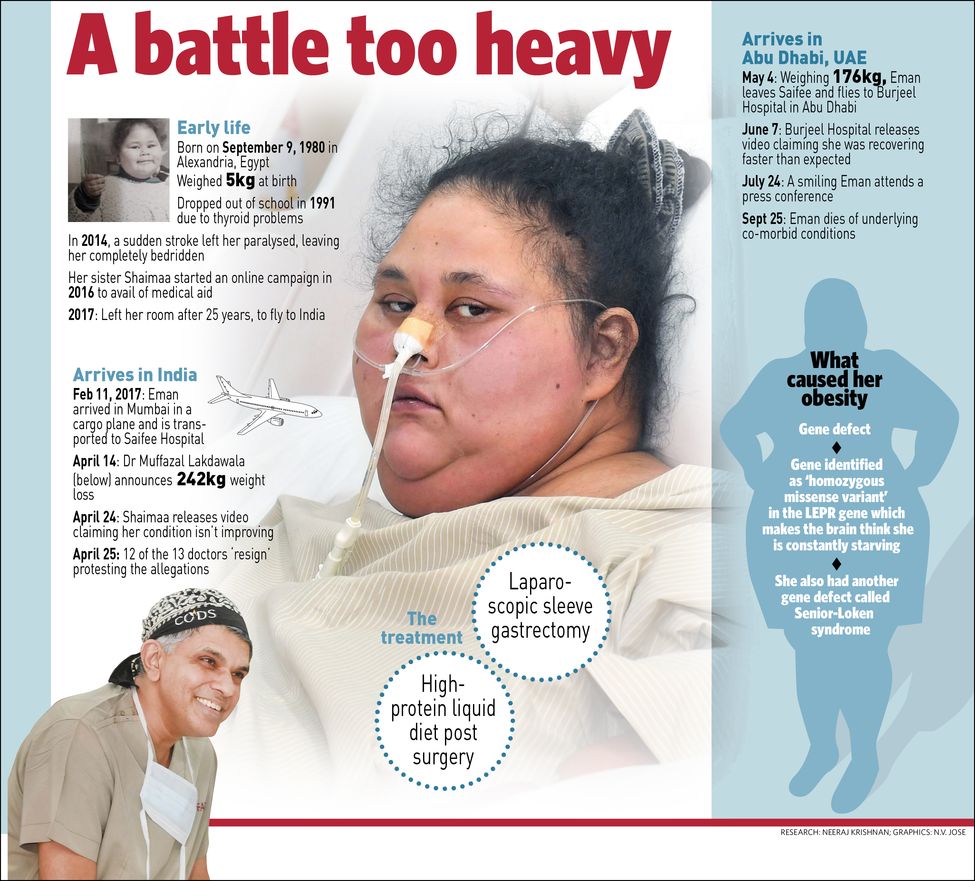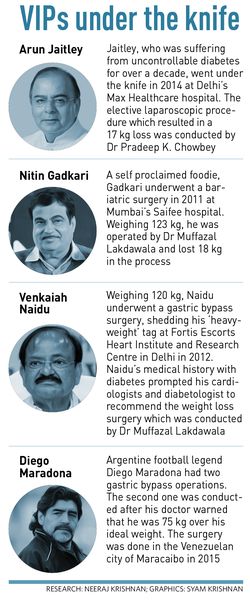
Dressed in a red hijab, Eman Ahmed Abd El Aty was propped up in bed with pillows. The 37-year-old Egyptian, believed to be the world’s heaviest woman at 500kg, looked radiant and alert when I met her at Abu Dhabi’s swanky Burjeel Hospital on September 20. Five days later she would be gone.
Room 528 on the fifth floor of the private hospital was Eman’s home for the last four months, after she was flown in from Mumbai’s Saifee Hospital in May. Wide corridors lit with soothing lights led to Eman’s room. When we entered the sprawling suite of 93sqm—with wooden panels and wide double doors—along with Eman’s younger sister, Shaimaa, colourful helium balloons tied to a small trolley greeted us. Giving Eman company was a nurse, who stood by the window next to her bed. While Eman never got a chance to step out of the hospital, the huge window, overlooking the city’s skyline, gave a glimpse of the beautiful city.
Eman acknowledged the presence of the two new visitors, THE WEEK’s chief photographer Janak Bhat and I, with a polite nod. When chief medical officer Dr Yassin El-Shahat entered the suite, she broke into a toothy grin. The smile turned into a high-pitched laugh when the doctor shared a joke with her in Arabic. He then asked her, in English, how she was feeling, and she flashed him a thumbs up sign. Though she was unable to speak, her eyes and facial expressions said it all.
Shaimaa said the doctors had told them that Eman would undergo a series of plastic surgeries, including liposuction, in October. “Eman is looking forward to that and she keeps asking me and the doctors when they would go ahead with the procedures,” Shaima told THE WEEK. “She wants to lose weight and look beautiful. She is full of hope for the future.” The treatment at Burjeel involving the surgeries was meant to get rid of the loose skin from her waist and limbs—an after-effect of being bedridden for nearly 25 years.
The doctors were initially reluctant to let me meet Eman, as she had recently had tooth extractions and had also recovered from bronchitis and the ulcer in her right knee. But they eventually agreed. Even Eman was initially awkward as I walked into the room, but she soon relaxed and shook our hands enthusiastically. When I asked her for a selfie, she happily obliged. That is when I realised why she was so likeable and popular among the hospital staff, both in Mumbai and Abu Dhabi, and also with her neighbours back home in Alexandria. Eman not only exuded warmth and approachability but also a quiet confidence. When Dr Shamsheer Vayalil, managing director of VPS Healthcare that owns Burjeel Hospital, entered her suite a few minutes later, her face lit up yet again and she managed to say, “Hi!”
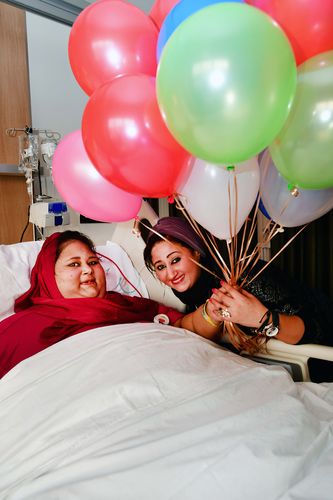 Support system: Eman with Shaimaa at Burjeel Hospital.
Support system: Eman with Shaimaa at Burjeel Hospital.
EMAN’S TRANSFORMATION WAS inspiring. The first time I met her was at Saifee Hospital, where she was under Dr Muffazal Lakdawala and his team’s care, in March. She had undergone a sleeve gastrectomy, where the stomach is reduced to 15 per cent of its original size, almost a month after coming to Mumbai in February. She had a feeding tube that went through her nose till her stomach. During my visit, she was fast asleep and her nose and mouth were covered with a continuous positive airway pressure mask. Her chin was indistinguishable from her neck, and the right side of her body was paralysed owing to a stroke she suffered three years ago.
In Abu Dhabi, Eman was finally able to use both her arms with ease and, according to doctors, she could also move her legs to an extent. Srividya Iyer, head, department of physiotherapy, said Eman’s progress was gradual and their first step was to motivate her to restart the physiotherapy sessions. “Once Eman saw the results, which included being able to bring her right hand till her mouth, she was thrilled,” said Iyer. “This motivated her to keep pushing herself harder.” Even during our photo shoot that lasted 15 minutes, she continued to smile despite feeling tired. At the end of the interview, Eman high-fived Shaimaa and gave us one last toothy smile before we left the room. According to speech therapist Reshma Rajanoop, Eman had also started saying a few words and, in another six to eight months, they expected her to talk like a normal person with continued speech therapy.
On September 25, much to the shock of the medical fraternity, Eman was declared dead. According to a statement released by the hospital, Eman died “at 4:35am due to complications from the underlying comorbid conditions including heart disease and kidney dysfunction....”
Dr Nabil Debouni, medical director of Burjeel, said, “She was shifted to the ICU on September 24, but her condition didn’t improve. On September 26, Shaimaa left for Alexandria along with Eman’s body after we managed to work out the logistics, so she could be reunited with her family as soon as possible.”
Speaking to THE WEEK from Alexandria, Shaimaa said, “After Eman’s last rites in Al-Omari mosque on September 26, I have now accepted her fate. She is in a better place. On September 24, she complained of uneasiness and was not able to urinate at all. She wasn’t breathless and was fully conscious when she was shifted to the ICU. However, her kidneys stopped functioning and a while later she stopped breathing. The doctors told me they tried their best to save her. No one can stop what God wants.”
In Abu Dhabi, Shaimaa had told THE WEEK that what stood out about Eman was her strength and fighting spirit. “She wants to go outside and see people. Drive a car, like a normal person. She would always ask me when she would be able to see our mother again,” said Shaimaa.
Eman’s mother, who works in a garment factory in Alexandria, had flown in for Eman’s surprise birthday party on September 9. She had left for Alexandria only six days before Eman’s death. Vayalil was also planning to later take Eman to Alexandria, as she missed her mother. (Her father had died last year.) Also, Eman had been away from home ever since she left for Mumbai.
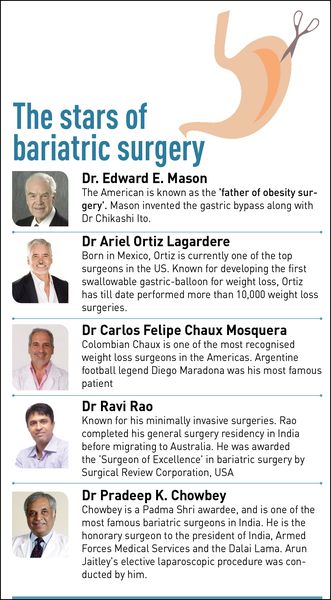
Eman had arrived in Mumbai on February 11 in a modified freighter aircraft, which was arranged by Lakdawala for Rs 83 lakh (sourced through crowdfunding and the Saifee Hospital Trust funds). Shaimaa had written to Lakdawala in September 2016, requesting him to treat Eman. She had also started a social media campaign for Eman’s treatment. Though Lakdawala readily agreed, Eman couldn’t travel immediately as her visa was rejected. Bedridden, she couldn’t visit the Indian embassy in Cairo. She finally got the visa after Lakdawala tweeted to External Affairs Minister Sushma Swaraj. Shaimaa, an engineer, quit her job and left her two-year-old daughter with her mother to accompany Eman to Mumbai.
EMAN, FONDLY CALLED ‘Mona’ by her mother and sister, started gaining weight since the age of 11. “Though she was forced to quit school after fifth grade, she has always been very intelligent. She is alert and aware of everything going on around her, but for me she is like a baby,” Shaimaa told THE WEEK in Abu Dhabi. In 2014, Eman lost her ability to speak following a stroke. “Before Eman suffered the stroke, her weight was not as high as 500kg. Back then, she had decided she wanted to change her life and was also undergoing physiotherapy at home and controlling her diet. She lost 50-60kg in three months,” recalled Shaimaa. Before the stroke, Eman was able to use the building’s elevator and with some help even sit in the car.
But after the stroke, Eman was shifted to a hospital in Alexandria where she spent two weeks in the ICU. “The doctors had told us we should pray for Eman as anything could happen. Her kidneys had stopped functioning and there was fluid accumulation in her lungs. Luckily, she was able to make it but she became completely dependent on my mother and me for basic tasks,” said Shaimaa.
Her family met many doctors and tried several treatments, but to no avail. It was only when Eman came to Mumbai that she was diagnosed with a rare genetic defect. Lakdawala said the cause for her obesity was a ‘homozygous missense variant’ in the LEPR (leptin receptor) gene, and it had been detected only once in an individual who was part of a research in the University of Maryland School of Medicine. Leptin, a hormone secreted mainly by the fat cells, gives signals to the hypothalamus in the brain and tells the body when it is full after consuming food. It is also responsible for burning fat. However, in Eman’s case, owing to the mutation, she would constantly feel starved.
During her 83-day stay at Saifee Hospital, Eman bonded well with the doctors and hospital staff. “The fondest memory I have of her is when she used to request the hospital staff to get her a chicken sandwich after her feeding tube was inserted,” said nephrologist Dr Hemal Shah.
Dr Aparna Bhaskar, a bariatric surgeon who was part of the team that brought Eman to India, said Eman enjoyed music, especially peppy Arabic music and some Bollywood numbers.
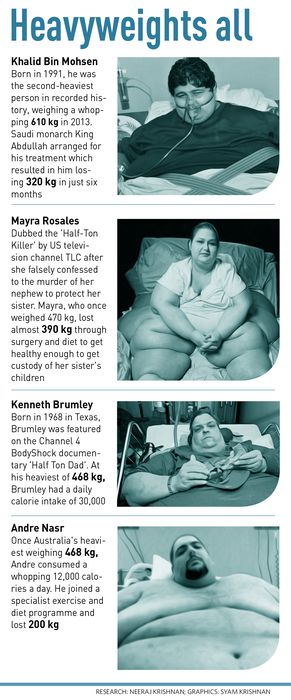
Eman was shifted to Burjeel following a spat between Shaimaa and Lakdawala’s team. While Lakdawala said that Eman had lost around 300kg by May, Shaimaa alleged that Lakdawala lied about Eman’s weight loss and that she didn’t receive adequate treatment after he had decided to send her back to Alexandria as her condition was ‘stable’. After Shaimaa took to social media to criticise the bariatric surgeon, Lakdawala and his team withdrew from Eman’s care. Shaimaa then reached out to the doctors from Burjeel, following which Eman was flown to Abu Dhabi.
At Burjeel, she was kept in the ICU for around a week. Doctors said she was suffering from severe depression, and also had a urinary tract infection and bedsores. A team of 20 doctors took care of her. Dr Nehad Halawa, head of ICU at Burjeel, said, “I was one of the doctors who had gone to Saifee Hospital to bring Eman to Abu Dhabi. It was only when we were on the plane that I discovered she had high temperature and high blood pressure and she was also suffering from severe infection. During the three-hour journey, we somehow managed to stabilise her condition with antibiotics and IV fluids.”
Halawa said Eman’s immunity was always a problem and even after her treatment in the ICU, she would suffer from urinary infections. On September 25, she suffered a septic shock, mainly owing to bacteria from a recurrent urinary infection. “After she was admitted, the sepsis had taken place twice,” he said. Once, soon after arriving from Mumbai, and later in mid-August when she suffered from an ulcer caused by bacteria in one of her knee joints. “As there were folds of skin around her knee, which is very poorly developed, she was prone to ulcers,” said Halawa.
Though aloof in the initial few weeks, Halawa said Eman slowly started growing attached to the hospital staff in Abu Dhabi. “After I got back from a month-long leave, she was so happy to see me that she hugged me,” he said. Just like in Mumbai, Eman shared her love for Arabic music with the hospital staff in Abu Dhabi. Doctors and nurses said she would jiggle to her favourite songs, and those were their fondest memories with her.
EMAN’S DAY WOULD begin between 8am and 9am, said head nurse Josmy Abraham. After that, she would be given the first dose of her medications. “A nurse would be present in Eman’s room 24x7 and we would work in 12-hour shifts,” she said. “While her medicines were given every hour, a group of us would help in changing her position every three hours. In the morning, we would also complete her catheter care among other tasks and apply moisturiser.”
At around 10am, Eman would be given breakfast, and Shaimaa would be allowed her first visit of the day. Eman’s physiotherapy would begin in the afternoon, followed by speech therapy. Clinical dietitian Dr Anita Das Gupta would visit her daily to monitor her diet intake. In the evening, Eman would watch cartoons in Arabic or an occasional movie. Her day would end with a bath around 10pm.
Gupta said Eman would consume between 600 and 800 calories a day. “Since she was a sleeve gastrectomy patient, the amount of food being given to her had to be strictly monitored as there was a risk of her vomiting.” However, the biggest challenge was to teach Eman to swallow food and liquids as she had relied on a feeding tube since her admission to Saifee Hospital. She was trained for a month and a half to swallow, and on June 22, her feeding tube was removed. By then, she was able to eat with her right hand, which was earlier paralysed, thanks to physiotherapy sessions.
“Her favourite food was hummus, watermelon and ful—a dish of cooked fava beans served with chopped vegetables and spices. However, initially, she was put on a dysphagia or blenderised diet, as she had trouble swallowing. Also, she was allergic to milk, lamb, beef, sesame seeds and shellfish,” said Gupta. Five days before Eman’s death, she could only eat pureed food as her teeth had to be extracted due to cavities.
While the doctors at the Burjeel never revealed Eman’s weight, they said she had been steadily losing weight, mainly through her diet and physiotherapy. They were hoping to bring her weight down to 120kg, to go ahead with the surgeries to improve the joints of her hips and knees. It cost nearly Rs 71,000 a day to treat Eman, said Halawa.
“Through Eman, we wanted to spread awareness about obesity,” said Vayalil. “That was our goal for taking up this case. We were funding her treatment and refused to accept donations from people who had come forward to help her. This was a humanitarian cause. After her plastic surgeries, I had planned on gifting her an electronic wheelchair so she could be independent.”
